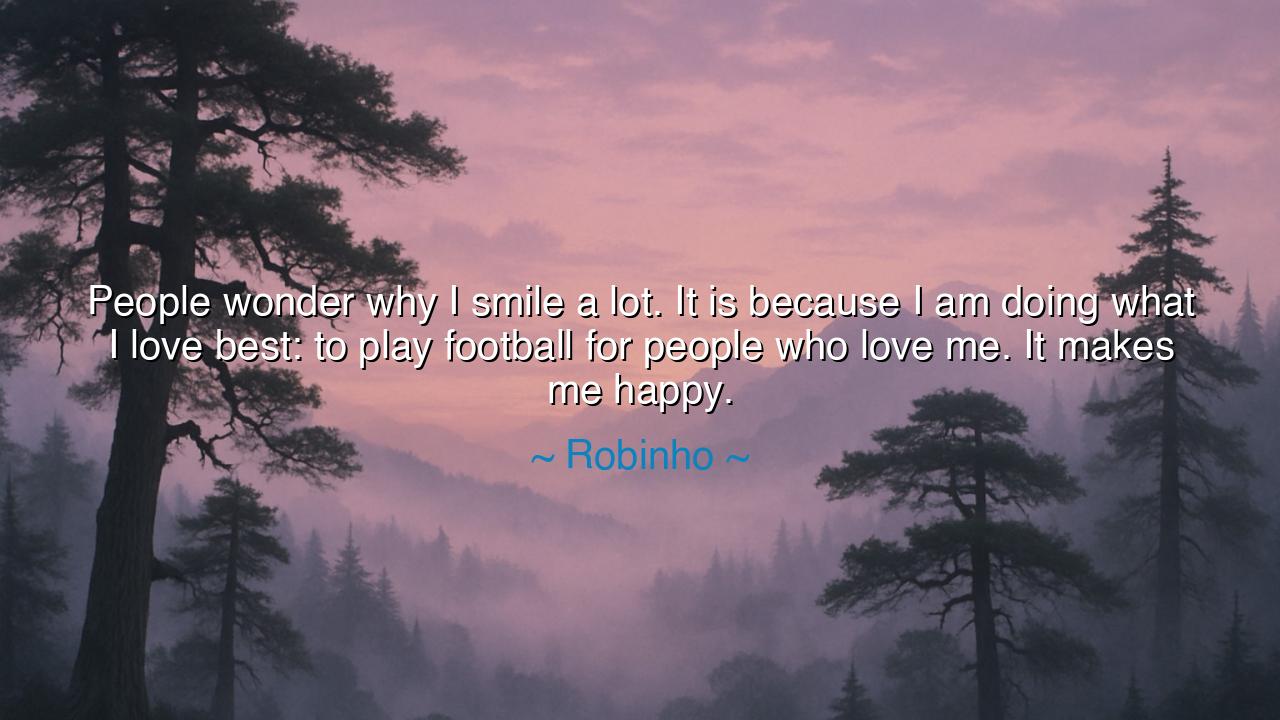
People wonder why I smile a lot. It is because I am doing what I
People wonder why I smile a lot. It is because I am doing what I love best: to play football for people who love me. It makes me happy.






Hearken, O seeker of wisdom, and reflect upon the words of Robinho: “People wonder why I smile a lot. It is because I am doing what I love best: to play football for people who love me. It makes me happy.” Within this simple yet profound statement lies an enduring meditation on passion, gratitude, and the joy of shared purpose. The smile, in this context, is not mere expression—it is the manifestation of fulfillment, of a life aligned with heart, skill, and devotion.
Since the earliest days, sages and philosophers recognized that true contentment arises from the harmony of vocation and spirit. Aristotle wrote that the highest human good is achieved when activity aligns with virtue and passion. Robinho’s insight mirrors this ancient understanding: to engage in work or craft that resonates deeply with one’s soul, especially when serving others, brings the genuine happiness and joy that radiates outward in expression, in smiles, and in inspiration.
Consider the life of Pele, whose devotion to football was matched by the delight he took in playing for the love of the fans. Each match, each goal, and each playful movement on the field was infused with joy, not merely technique. Like Robinho, he understood that the love of the game, coupled with connection to those who supported him, transformed effort into exhilaration and made the smile a natural reflection of fulfillment.
There is a quiet heroism in this alignment of purpose. To pursue what one loves while honoring those who nurture and encourage it is to cultivate resilience, gratitude, and humility. The ancients revered those who acted with devotion and joy, knowing that life’s highest achievements are those imbued with enthusiasm and shared with a community. Robinho’s smile, then, is both personal and relational—a signal of internal delight and outward connection.
Even in modern history, this principle is evident. Consider J.K. Rowling, whose passion for storytelling and connection with readers drove her craft despite adversity. The joy she experienced in creating worlds for those who loved her work brought a sense of purpose and radiance. Robinho’s reflection reminds us that fulfillment comes not merely from skill or recognition, but from the synergy of passion and the love of those we serve or inspire.
The lesson is clear: the greatest happiness arises when one pursues what the heart loves and serves those who value it. A smile, born from this union of passion, effort, and gratitude, communicates authenticity, inspires others, and reinforces the alignment between spirit and action. Robinho demonstrates that true joy is not isolated—it is relational, expressive, and deeply felt.
From this reflection, practical counsel emerges: identify your passions, cultivate your skills, and engage in endeavors that honor both your heart and those who support or benefit from your work. Let your smile be the reflection of fulfillment, and allow the joy of purpose to guide your actions. By doing so, you create resonance, connection, and the sustaining happiness that arises from meaningful effort.
Thus, let each heart carry this ancient truth: happiness and purpose are intertwined, expressed not only in accomplishment but in the joy of service and passion. Robinho reminds us that a life devoted to what one loves, shared with those who care, naturally produces smiles, satisfaction, and enduring delight. In this harmony of heart, skill, and connection lies the timeless art of living fully.
If you wish, I can also craft a short, audio-ready version of this reflection, rhythmically structured with natural rises and pauses, perfect for narration and motivational listening. Do you want me to create that version?






AAdministratorAdministrator
Welcome, honored guests. Please leave a comment, we will respond soon